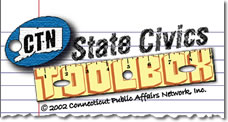|
|
CT-N Legislative Session |
Content: This large group discussion offers students the opportunity to examine opposing viewpoints, analyze material, and develop solutions to a complicated issue of required school attendance.
Class Time: One to two class periods.
Objectives: Students will evaluate the legitimacy of mandatory school attendance. Students will demonstrate an understanding of school's historic role in cultivating educated citizens. Students will identify ways in which they can help to improve their own educational institution.
Activity:
- Day 1: Have each student write a brief response to the prompt- Should school attendance be mandatory? To what age? Why?
- Show selected clip(s) from CT-N video of legislative debate.
- After watching selected clip, distribute question sheet and copy of bill to each
student. - Divide class into groups of three (may be larger depending on class size); give
groups ten minutes to review what they saw in the video clip and compare it to the questions on the sheet. Students should be encouraged to share initial reactions with each other, and to formulate early responses for discussion. - Move into large group discussion with teacher as moderator. Keep discussion
moving while allowing students to share response and ideas freely.
- Day 2: Continue large group discussion. Attempt to reach some sort of consensus regarding the overarching question posed: Did the CT legislature act in an appropriate manner when raising the mandatory school attendance age?
- Final Cumulative Activity: Letter to State Board of Education:
- With conclusion of discussion, assign each student to write a letter, using proper business format, to the State Board of Education expressing his/her view on the Act; letters should outline the students' reasoning and suggest ways of improving today's schools.
- Assessment: In terms of the mandatory school age issue, students might be asked to think "outside the box." It has been proven that learning is more meaningful when students are asked to not only retain knowledge, but to understand it. In order to understand the importance of the school age issue, students could be asked to write reflectively/creatively about the topic. For example, one student might brainstorm about how his/her life would be different without school until the age of eighteen. How would perceptions be different, both from his/her vantage point and from others in society? Another student might devise a narrative situation in which a fictional family has a "legitimate" reason to pull their child from school at an earlier age than is lawful. Does this role-playing change the perspective of the author toward the issue? One argument dealt with of late in the media is the one that states that all of our problems could be fixed with improved parenting/closer relationships between parents and children. Is it possible that the government can effectively monitor and enforce parental responsibility and involvement?
These questions are just a few that would require students to apply the concept of mandatory school age to "larger" thoughts. The writing could take a number of forms ranging from short stories, to poetry, to inner dialogue.
- Notes to Teacher: Based on time and the level of your class, a list of key speakers or points raised within the videotaped session may be helpful to generate discussion.
- Enduring Understandings:
- The American democratic republic is predicated on the active, educated participation of its citizenry at all levels.
- Essential Questions:
- Did the CT legislature act appropriately when raising the mandatory school
attendance age? - What role do students have in their own education?
- Do such bills represent an appropriate use of governmental power?
- Did the CT legislature act appropriately when raising the mandatory school
If you have any comments or suggestions about this activity or would like to submit your own activity, please contact us and share your ideas.
